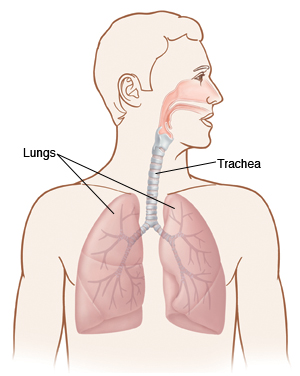Hemoptysis is the medical term for coughing up blood. Many things, including minor illnesses like bronchitis, can cause it. It can also be an early sign of a more serious illness, like a blood clot in the lung (pulmonary embolism), cancer, tuberculosis, or pneumonia.
Less common causes of hemoptysis can be hard to diagnose in an emergency room or a clinic. More testing will be needed if the symptoms continue.
Home care
-
Stay away from cigarette smoke. Smoke irritates the bronchial passages.
-
Unless you are taking daily aspirin to prevent stroke or heart attack, don't take aspirin or products that contain aspirin. Check with your health care provider to see if you should continue the aspirin or when you should restart it if you develop hemoptysis. Aspirin affects how easily the blood clots. Medicines that prevent clotting may make hemoptysis worse.
-
If you have a lung infection, drink extra fluid. This will help loosen lung secretions.
-
Over-the-counter (OTC) cough medicines that contain dextromethorphan may help reduce coughing. Note: Check with your provider before taking dextromethorphan or other OTC medicines if you have a chronic illness, are pregnant, or take daily prescribed medicines.
-
If you were prescribed an antibiotic, take it until it's all gone. Take it even if you're feeling better after only a few days.
Follow-up care
Follow up with your health care provider, or as advised.
When to call your doctor
Contact your health care provider right away if you have:
-
A fever of 100.4ºF (38ºC) or higher, or as advised by your provider
Call 911
Call
-
You cough up more blood.
-
You have trouble breathing, wheezing, or pain with breathing.
-
You have chest pain or chest pressure.
-
You faint or lose consciousness.
-
You have a fast heartbeat.
-
You feel weak or dizzy.
-
You have a feeling of doom.


